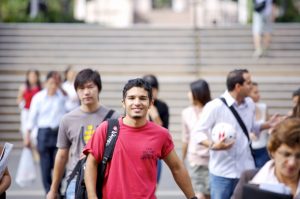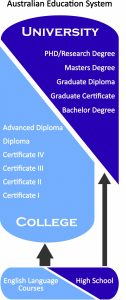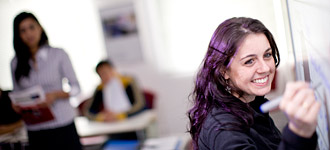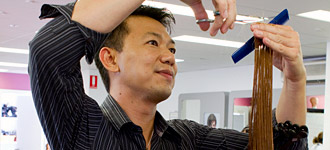 Colleges in Australia offer International Students the opportunity to study and learn from an amazing range of courses including:
Colleges in Australia offer International Students the opportunity to study and learn from an amazing range of courses including:
College courses range in length from 3 months to 2 years and normally the English language entry level into these courses is an IELTS exam result of 5.5 or higher. This is the equivalent to a TOEFL score of 196 (CBT). Students will attend classes 2 to 5 days per week and at many colleges in Australia, international students will study together with local Australian students. This can be an extra bonus for students trying to improve their’ English language skills even more and is also a good opportunity to make Australian friends.
Qualifications gained through study at college in Australia are recognised by the Australian Government as well as being recognised in most countries and by most industry associations around the world.
All international students who meet the English language entry requirement and who have completed a minimum of 1 year of high school in their’ home country will be eligible to begin study at college in Australia.
 All government recognised courses taught at colleges in Australia are awarded a level of qualification ranging from a Certificate I through to an Advanced Diploma. This level of qualification is determined and regulated by the Australian government and begins with qualifications at the Certificate I level. The highest level of qualification at the Certificate level is a Certificate IV.
All government recognised courses taught at colleges in Australia are awarded a level of qualification ranging from a Certificate I through to an Advanced Diploma. This level of qualification is determined and regulated by the Australian government and begins with qualifications at the Certificate I level. The highest level of qualification at the Certificate level is a Certificate IV.
Above the level of Certificate IV, qualifications awarded to students that are recognised by the Australian Government are given the title of Diploma or Advanced Diploma. An Advanced Diploma is the highest level of qualification available through study at college in Australia.
In general the length of a Certificate course at college will range from 4 to 12 months and depending on the particular area of study, a Diploma or Advanced Diploma course will take a student between 6 and 18 months to complete. For many college courses students will be able to begin study from the Diploma level. There are however certain courses and areas of study that will require students to have completed courses at the Certificate level before being able to commence studies at the Diploma level or higher.
For more information on the full range of courses available for international students at college in Australia, please contact Sea Education.

Courses in hospitality cover a range of study areas including training to become a chef, baker or pastry chef, through to studying to become a professional waiter or waitress. For students that would like to study the administration and management side of the hospitality industry, courses in hospitality management will teach students the skills required to be able to manage a hotel, restaurant or other hospitality based business.
Hospitality courses will often include practical lessons where students will be placed into real working environments and be required to perform ‘real work’ in restaurants, kitchens and hotels. Depending on the particular course being studied, students may have the opportunity to gain experience on the front desk of a 5 star hotel, or be assisting chefs in the kitchen of a world class restaurant.
A qualification in hospitality will assist graduates looking for work both in Australia as well as in other countries. With a qualification in hospitality and some industry experience, many hospitality students are often able to quickly find work and gain extra experience at local hotels, restaurants and cafes.

Information Technology courses have developed and expanded significantly over recent years, with the range of IT courses available for international students now including courses in:
Students choosing to study IT systems or software will be able to learn skills in the areas of server set-up, Java programming, networking and how to provide and maintain secure networks. Students will also learn how to create databases and spreadsheets as well as how to use many of the most commonly used business applications currently in use.
Students choosing to study the hardware side of IT will learn the skills required to diagnose and fix different computer hardware errors, how to build and maintain computers and servers, and more recently how to set up and maintain a telecommunication network.

Event management is a relatively new but popular area of study now available for international students. Within an event management course students learn how to organise, promote and stage various types of events. Students will learn how to arrange and co-ordinate the different aspects of an event such as transport and marketing, staff and catering, sound and lighting as well as the financial details of an event.
In many event management courses students will have the opportunity to be able to work behind the scenes of real events taking place in the local community and may include events such as weddings, concerts, surfing competitions, conventions or motor racing events. Students will be given the opportunity to learn many of the behind the scenes details as well as how to handle the pressure of a managing a major event.

To become a qualified English teacher, students will need a Certificate IV in TESOL (Teaching English to Speakers of Other Languages). This is the minimum qualification required by a person to be able to work as an English Teacher at a language school in Australia and in most countries around the world. TESOL is a popular qualification in Australia and is becoming very widely known throughout Asia, South America and other non-English speaking countries, as a high level officially recognised English teaching qualification.
Within a TESOL course students will learn how to successfully teach English to non-English speaking students and how to best use many of the different methods and techniques utilised by English teachers. TESOL students will learn how to prepare and teach lessons to different levels of English students, as well as how to assess a students’ level of English ability. Throughout a TESOL course students will also be taught certain advanced grammar relevant to the course content.

The fields of nursing and aged care are two of the most rewarding careers possible for people who want to give something back to the community. By gaining a qualification in nursing, students will be qualified to be able to care for the sick and injured in a wide range of work place environments.
There are 2 levels of nursing qualifications in Australia and the entry level qualification for nursing is able to be gained through study at the college level. This qualification is referred to as an Enrolled Nurse (EN). The higher qualification, Registered Nurse (RN), is gained through study at the university level. The level of a nurses’ qualification will determine the particular work and procedures that a nurse is able to perform as well as the medications they are able to administer to patients.
Aged care study is primarily for students who would like to care for elderly patients in aged care facilities or who have elderly relatives for whom they would like to learn how to care for. Students will be placed for practical experience at local aged care facilities for a portion of their studies and will learn the skills required to work in the aged care industry. Student will learn skills required to care for and feed patients, how to assist with transport and how to maintain the general health and wellbeing of elderly patients.

Qualifications in fitness gained through study at the college level can be used to gain employment in the fitness and health industry in positions such as personal trainers and gym instructors. Fitness courses focus on the structure of the human body and muscular system, healthy nutrition and the effects of different types of exercise on the human body. Designing exercise and gym programs as well as learning how to manage a fitness based small business are also skills that are taught within a fitness course at college.

A course in automotive technology is designed to teach students all of the skills required to work as a fully qualified motor mechanic. Students will learn in detail the inner workings of car components including the engine and gearbox, brake, clutch, fuel and cooling systems, and will be taught the specialist skills and techniques required for servicing, repairing and maintaining these components. Students will also be taught how to correctly use a wide range of tools and equipment commonly utilised in the automotive repair industry as well as being required to perform practical maintenance and repair work on cars and car components supplied by the college.
As well as learning the practical side of becoming a motor mechanic, students will also be taught basic first aid and work place health and safety, as well as the knowledge and skills required to run an automotive repair business.

Fashion design courses are designed for people with a passion for fashion and who want to take it to the next level. Students will be able learn all aspects of fashion design from how to source and purchase materials and fabrics, through to drawing and cutting patterns and stitching together garments. Students will learn the different techniques used in piecing together garments, as well as how to use some of the most modern equipment in the industry.
Fashion design students will have the opportunity to show their designs and creations to the public at various fashion shows arranged both at school and in the local community. Each year a number of talented fashion design’ students will also be selected to display their’ creations at larger industry events.

Business and Commerce studies cover a large range of areas including business management, international business, accounting and finance, marketing and human resources management (HR). Business students are able to begin studies from the Certificate II level, with a wide range of courses being offered right through to the Advanced Diploma level.
Graduates from business courses will have the skills needed to enter into the workforce in their’ chosen career or go onto further study at university in order to gain higher qualifications. Business courses will also be of benefit to students with the ambition of starting and running their’ own small business or company.

Graphic design and digital animation students will learn from industry professionals all of the skills required to digitally design and create, using the most up to date equipment and software including Illustrator, Photoshop, Dreamweaver and Flash. Students will learn techniques required for digital design and animation in both 2D and 3D, as well as skills such as page layout and design, typography and how to prepare quotes when working with clients.
In certain courses students will have the opportunity to work with real clients and create real advertising material, logos and web-sites to suit a particular clients needs. Students will be given the opportunity to consult with a client, work through the design process, and at the end deliver a fully functioning web-site, logo or advertising design to their’ client.
Possible career opportunities for graduates from graphic design and digital animation courses include:
The demand for competent and skilled workers in the areas of graphic design and digital animation is often so high that many students will find work opportunities before they even complete their’ course.

Students interested in studying a course in childcare must first apply for and be eligible to receive an Australian Blue Card. This is a registration card issued by the Australian Government that is required by people who work with, or study in a course that involves children. The Blue Card application is free for students and volunteers and Sea Education staff can assist students with the application process.
The first level of qualification for childcare in Australia is a Certificate III in Children’s Services and will enable students to be able to work as a child care assistant at a childcare centre. Higher qualifications requiring more time and study will allow students to work as a supervisor or childcare centre manager.
While studying a course in childcare students will be placed at local childcare centres and will be required to work alongside qualified childcare workers in order to gain the practical experience required to be able with children within the childcare sector. Most childcare students are also able to find paid work at local childcare centres during their’ studies.

Massage courses are available in a range of styles from remedial and Swedish massage through to massage and treatment for professional athletes, lymphatic massage and hot-stone massage. Students interested in working in the massage or beauty therapy industry in Australia are required to hold a nationally recognised qualification. These qualifications allow students to become registered with relevant industry bodies and also to apply for professional insurance.
Massage students will be taught the anatomy of the human body along with various different techniques and styles used for improving circulation, reducing muscle tension and stress, and the correct techniques used for the treatment of muscular injuries.
Beauty therapy courses will teach students a wide range of different procedures currently used within the beauty industry. Students will learn techniques including waxing and bleaching, manicures and pedicures as well as a range of different make-up application techniques used in the industry.

For artistic students who want to develop their’ finer skills, courses in painting and drawing, sculpture and ceramics and photography are available. Students will be given the instruction needed, but also allowed the flexibility required to be able to express their individualism through art.
Photography courses will cover all aspects of photography ranging from black and white and 35mm photography through to digital photography and the digital manipulation of photos through software such as Adobe Photoshop. Different aspects of lighting and frame composition as well as learning how to take advantage of the full features of a digital SLR camera will also be covered. Photography students are required to have their’ own digital SLR camera.
Painting and visual arts students are able to study a range of different artistic techniques in order to build on and develop particular artistic skills. Painting and drawing students will begin by learning the very basic techniques before going onto study the work of some of the masters of art. Students will learn basic shaping, shading and texturing and have the opportunity to partake in life drawing sessions and visit local artists in local studies. Ceramics students will learn the correct use a pottery wheel as well as the techniques involved in firing pottery in a pottery kiln. Students will partake in gallery showings and even have the opportunity to sell pieces of work to the public.

Hairdresser students will learn all the skills required to be able to express their’ creative side through hair and design. Students begin their’ studies with work from textbooks before moving onto learning cutting and styling techniques through practise on specially designed hairpieces and mannequins.
When a students’ skill with the scissors reaches a satisfactory level, students will be given the opportunity to move onto cutting the hair of paying customers (while studying under the supervision of trained instructors). Most colleges teaching hairdressing will have their own on site hairdressing salon where paying clients are able to come in and have a haircut, colour or perm just like at a normal salon. The only difference is that the hairdressers are up and coming students and the prices are a bit cheaper.
Courses in hairdressing salon management are also available and will teach students the skills and knowledge required to be able to open and manage their’ own hairdressing salon.